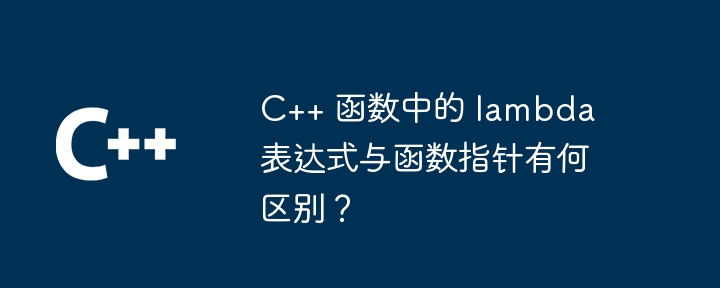Home >Backend Development >C++ >What is the difference between lambda expressions and function pointers in C++ functions?
What is the difference between lambda expressions and function pointers in C++ functions?
- WBOYWBOYWBOYWBOYWBOYWBOYWBOYWBOYWBOYWBOYWBOYWBOYWBOriginal
- 2024-04-25 16:12:021492browse
Lambda expressions and function pointers are both mechanisms for encapsulating code in C, but they differ in implementation and characteristics: Implementation method: function pointers point to the memory address of the function, while Lambda expressions are inline anonymous code piece. Return type: The return type of a function pointer is fixed, whereas the return type of a lambda expression is determined by its body code block. Variable capture: Function pointers cannot capture external variables, while lambda expressions can capture external variables by reference or value through the [&] or [=] keywords. Syntax: Use asterisks (*) for function pointers and square brackets ([]) for lambda expressions.

The difference between Lambda expressions and function pointers in C functions
Introduction
Lambda expressions and function pointers are both mechanisms in C for encapsulating code into callable entities. Although they have similar purposes, they have some key differences in their implementation and features.
Implementation
- Function pointer: A variable pointing to the memory address of the function.
- Lambda expression: An anonymous inline block of code that can capture external variables and operate on them.
Return type
- Function pointer: The return type of the function pointer is fixed to the return type of the pointed function.
- Lambda expression: The return type of a Lambda expression is determined by its body code block.
Variable capture
- Function pointer: Cannot capture external variables.
-
Lambda expression: can be captured by
[&](capture by reference) or[=](capture by value) keyword external variables.
Syntax
-
Function pointer:
returnType (*functionPointerName)(parameterList); -
Lambda expression:
[captureList](parameterList) -> returnType { body }
Practical case
Function pointer case
// someFunction 是一个返回 int 的函数,接受 int 和指针作为参数 int someFunction(int a, int *ptr); // 定义指向 someFunction 的函数指针 int (*pFunc)(int, int *) = someFunction; // 使用函数指针调用 someFunction int result = (*pFunc)(10, &x);
Lambda expression case
// 定义捕获外部变量 x 的 lambda 表达式
auto f = [&](int a) -> int { return a * x; };
// 使用 lambda 表达式
int result = f(10);Summary of key differences
| Features | Function pointer | Lambda expression |
|---|---|---|
| Implementation | Point to memory address | Inline anonymous code block |
| Return type | Fixed to function type | Determined by the body code block |
| Variable capture | Prohibited | Allow, capture by value or by reference |
| Syntax | Use asterisks (*) | Use square brackets ([]) |
The above is the detailed content of What is the difference between lambda expressions and function pointers in C++ functions?. For more information, please follow other related articles on the PHP Chinese website!

